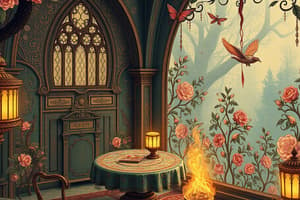Podcast
Questions and Answers
Based on their observations of Rembrandt's technique, the students correctly state that...
Based on their observations of Rembrandt's technique, the students correctly state that...
- Overlapping lines create darker values (correct)
- The forms are flattened through gradation
- Color is needed to complete the work
- Negative space is the dominant feature
According to Viktor Lowenfeld, the drawings of most children in the 7 through 9-year-old age range fall within which stage of artistic development?
According to Viktor Lowenfeld, the drawings of most children in the 7 through 9-year-old age range fall within which stage of artistic development?
- The pseudo-naturalistic stage
- The scribbling stage
- The schematic stage (correct)
- The preschematic stage
For traditional art making processes such as painting, the three primary colors are...
For traditional art making processes such as painting, the three primary colors are...
- Blue, green, and yellow
- Red, green, and blue
- Yellow, orange, and violet
- Red, yellow, and blue (correct)
Which of the following color schemes uses colors that are adjacent to one another on the color wheel?
Which of the following color schemes uses colors that are adjacent to one another on the color wheel?
For kindergarten children learning to paint with watercolors, it is useful for the teacher to demonstrate which TWO of the following?
For kindergarten children learning to paint with watercolors, it is useful for the teacher to demonstrate which TWO of the following?
Which TWO of the following are printmaking processes?
Which TWO of the following are printmaking processes?
This demonstration of creating an ink-blot print can effectively introduce which principle of visual design?
This demonstration of creating an ink-blot print can effectively introduce which principle of visual design?
During a unit on ancient civilizations, students learn that ancient Egyptian art most frequently focused on...
During a unit on ancient civilizations, students learn that ancient Egyptian art most frequently focused on...
What does the painting series of water lilies by Claude Monet demonstrate about his observational skills?
What does the painting series of water lilies by Claude Monet demonstrate about his observational skills?
Which activity is appropriate for first-grade students to teach the relationship between quarter notes and eighth notes?
Which activity is appropriate for first-grade students to teach the relationship between quarter notes and eighth notes?
In 'Ah Poor Bird,' the numbers in the square indicate that the song...
In 'Ah Poor Bird,' the numbers in the square indicate that the song...
In 'Ah Poor Bird,' which measure contains the note G on the second beat?
In 'Ah Poor Bird,' which measure contains the note G on the second beat?
Which music-arranging activity is most appropriate for third-grade students creating an accompaniment to a familiar song?
Which music-arranging activity is most appropriate for third-grade students creating an accompaniment to a familiar song?
Flashcards are hidden until you start studying
Study Notes
Art Education Concepts
-
Rembrandt van Rijn's etching "Self-Portrait Leaning on a Stone Sill" showcases:
- Overlapping lines for darker values.
- Flattened forms through gradation.
- Incorrect: Color is not necessary for completion.
-
Viktor Lowenfeld defines artistic development stages in children aged 7-9:
- Most children are in the schematic stage, characterized by recognizable forms.
-
Traditional painting utilizes primary colors:
- The primary colors are red, yellow, and blue.
-
Color schemes in art:
- Analogous color schemes use adjacent colors on the color wheel (e.g., blue-green, green, yellow-green).
Techniques and Processes in Art
-
For kindergarten watercolor painting:
- Demonstrate the use of crayon wax resist.
- Show how adding water makes colors lighter and more transparent.
-
Printmaking involves processes such as:
- Engraving and linocut.
Principles of Design
- Ink-blot print demonstration effectively introduces:
- The principle of balance in visual design.
Historical Art Context
- Ancient Egyptian art predominantly aimed at ensuring:
- The well-being of the deceased in the afterlife.
Impressionism Understanding
- Claude Monet's water lilies demonstrate:
- The changing nature of light and reflection.
Music Education
-
Teaching quarter notes and eighth notes for first graders:
- Appropriate activity: One group pats quarter notes while another pats 2 eighth notes to each quarter note.
-
In the song "Ah Poor Bird":
- Numbers in the square suggest the song can be sung as sound.
-
Measure 2 contains the note G on the second beat.
-
For third graders creating song accompaniments:
- Most suitable activity: Composing a rhythm pattern to clap along with the song.
Studying That Suits You
Use AI to generate personalized quizzes and flashcards to suit your learning preferences.




